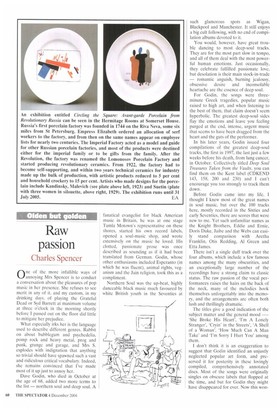Raw Passion
Charles Spencer
One of the more infallible ways of annoying Mrs Spencer is to conduct a conversation about the pleasures of pop music in her presence. She refuses to see merit in any of it. and my custom, in my drinking days, of playing the Grateful Dead or Syd Barrett at maximum volume at three o'clock in the morning shortly before I passed out on the floor did little to mitigate her prejudice.
What especially irks her is the language used to describe different genres. Rabbit on about bubblegum and psychedelia, pomp rock and heavy metal, prog and punk, grunge and garage, and Mrs S. explodes with indignation that anything so trivial should have spawned such a vast and ridiculous critical vocabulary. Indeed, she remains convinced that I've made most of it up just to annoy her.
Dave Godin, who died in October at the age of 68, added two more terms to the list — northern soul and deep soul. A fanatical evangelist for black American music in Britain, he was at one stage Tamla Motown's representative on these chores, started his own record labels, opened a soul-music shop, and wrote extensively on the music he loved. His clotted, passionate prose was once described as sounding as if it had been translated from German. Godin, whose other enthusiasms included Esperanto (in which he was fluent), animal rights, veganism and the Jain religion, took this as a compliment.
Northern Soul was the up-beat, highly danceable black music much favoured by white British youth in the Seventies at such glamorous spots as Wigan, Blackpool and Manchester. It still enjoys a big cult following, with no end of compilation albums devoted to it.
You would, however, have great trouble dancing to most deep-soul tracks. They are for the most part slow in tempo, and all of them deal with the most powerful human emotions. Just occasionally, they celebrate fulfilled passionate love, but desolation is their main stock-in-trade — romantic anguish, burning jealousy, obsessive desire and inconsolable heartache are the essence of deep soul.
For Godin, the songs were threeminute Greek tragedies, popular music raised to high art, and when listening to the best of them, that claim doesn't seem hyperbolic. The greatest deep-soul sides flay the emotions and leave you feeling purged at the end, intense, urgent music that seems to have been dragged from the heart and the guts of the performer.
In his later years, Godin issued four compilations of the greatest deep-soul tracks, the first in 1997, the last just a few weeks before his death, from lung cancer, in October. Collectively titled Deep Soul Treasures Taken from the Vaults, you can find them on the Kent label (CDKEND 143, 158, 200 and 230) and I can't encourage you too strongly to track them down.
Before Godin came into my life. I thought I knew most of the great names in soul music, but over the 100 tracks here, mostly recorded in the Sixties and early Seventies, there are scores that were new to me. Yet such unfamiliar names as the Knight Brothers, Eddie and Ernie, Doris Duke, Jaibe and the Webs can easily stand comparison with Aretha Franklin, Otis Redding, Al Green and Etta James.
There isn't a single duff track over the four albums, which include a few famous names among the many obscurities, and an exceptionally large number of the recordings have a strong claim to classic status. The raw passion of the vocal performances raises the hairs on the back of the neck, many of the melodies hook themselves unforgettably into the memory, and the arrangements are often both lush and thrillingly dramatic.
The titles give a good indication of the subject matter and the general mood — She Broke His Heart', 'I'm A Lonely Stranger', 'Cryin' in the Streets', 'A Shell of a Woman', 'How Much Can A Man Take' and 'I'm Sorry I Hurt You' among them.
I don't think it is an exaggeration to suggest that Godin identified an unjustly neglected popular art form, and preserved it for posterity in these lovingly compiled, comprehensively annotated discs. Most of the songs were originally singles on obscure labels that flopped at the time, and but for Godin they might have disappeared for ever. Now this won
derful body of work has been preserved, and anyone who has ever loved and lost — something of a specialist subject at The Spectator — will find musical masterpieces here that bring back all that churning emotion with matchless empathy, clarity and power.
Be careful, though. In short bursts — and I would recommend no more than half-a-dozen songs at a sitting — this music is indeed cathartic. Overindulge, however, and you may find yourself, as I did the other day, walking down the street with tears running unstoppably down your cheeks and the black dog of depression snapping nastily at your ankles.
Charles Spencer is theatre critic of the Daily Telegraph.



















































































 Previous page
Previous page